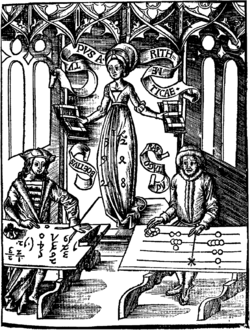- Algorism
-
Not to be confused with Algorithm.
Algorism is the technique of performing basic arithmetic by writing numbers in place value form and applying a set of memorized rules and facts to the digits. One who practices algorism is known as an algorist. This system largely superseded earlier calculation systems that used a different set of symbols for each numerical magnitude and in some cases required a device such as an abacus.
Contents
Etymology
The word "Algorism", comes from the name Al-Khwārizmī (c. 780-850), a Persian mathematician, astronomer, a geographer and a scholar in the House of Wisdom in Baghdad, whose name means "the native of Kharazm", a city that was part of the Greater Iran during his era and now is in modern day Uzbekistan[1][2][3] He wrote a treatise in Arabic language in the 9th century, which was translated into Latin in the 12th century under the title Algoritmi de numero Indorum. This title means "Algoritmi on the numbers of the Indians", where "Algoritmi" was the translator's Latinization of Al-Khwarizmi's name.[4] Al-Khwarizmi was the most widely read mathematician in Europe in the late Middle Ages, primarily through his other book, the Algebra.[5] In late medieval Latin, algorismus, the corruption of his name, simply meant the "decimal number system" that is still the meaning of modern English algorism. In 17th century French the word's form, but not its meaning, changed to algorithm, following the model of the word logarithm, this form alluding to the ancient Greek arithmos = number. English adopted the French very soon afterwards, but it wasn't until the late 19th century that "algorithm" took on the meaning that it has in modern English.[6] In English, it was first used about 1230 and then by Chaucer in 1391.[7] Another early use of the word is from 1240, in a manual titled Carmen de Algorismo composed by Alexandre de Villedieu. It begins thus:
"Haec algorismus ars praesens dicitur, in qua Talibus Indorum fruimar bis quinque figuris."
"Algorism is the art by which at present we use those Indian figures, which number two times five."
The word Algorithm also derives from "Algorism", a generalization of the meaning to any set of rules specifying a computational procedure. Occasionally algorism is also used in this generalized meaning, especially in older texts.
History
Starting with the integer arithmetic developed in India using base 10 notation, Al-Khwārizmī along with other mathematicians in medieval Islam, both Iranian and Arabic, documented new arithmetic methods and made many other contributions to decimal arithmetic (see the articles linked below). These included the concept of the decimal fractions as an extension of the notation, which in turn led to the notion of the decimal point.
See also
References
- ^ Toomer 1990
- ^ Hogendijk, Jan P. (1998). "al-Khwarzimi". Pythagoras 38 (2): 4–5. ISSN 0033–4766. http://www.kennislink.nl/web/show?id=116543.
- ^ Oaks, Jeffrey A.. "Was al-Khwarizmi an applied algebraist?". University of Indianapolis. Archived from the original on 2010-11-15. http://facstaff.uindy.edu/~oaks/MHMC.htm. Retrieved 2008-05-30.
- ^ Al-Khwarizmi: The Inventor of Algebra, by Corona Brezina (2006)
- ^ Foremost mathematical texts in history, according to Carl B. Boyer.
- ^ Etymology of algorithm at Dictionary.Reference.com
- ^ Oxford English Dictionary (first quote c1230CE, Chaucer c1391, and later quotes showing continuing usage since then)
Categories:- Numeration
- Algorithms
Wikimedia Foundation. 2010.

